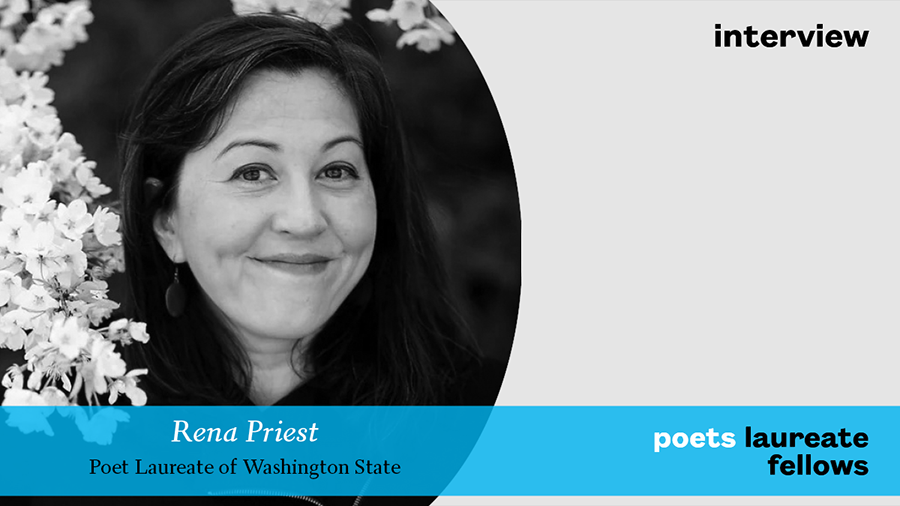
Rena Priest is the author of several books, including Northwest Know-How: Beaches (Sasquatch Books, 2022) and Patriarchy Blues (Moonpath Press, 2017), which received an American Book Award. Priest was appointed Washington state poet laureate in 2021 and is the 2022 Maxine Cushing Gray Distinguished Writing Fellow. In 2022, she received an Academy of American Poets Laureate Fellowship. Priest will create a poetry anthology celebrating Washington state salmon runs and Washington poets. The anthology hopes to raise goodwill and a feeling of reverence for the salmon—a feeling that has guided the tribe’s long-standing stewardship over salmon habitats and harvest management to ensure their success as a species. Priest will work with the Washington Center for the Book and regional tribal organizations to offer workshops where new poems can be created, and the anthology will be publicized through a call for submissions.
Poets.org: What do you hope for the future of poetry in Washington, and what support do you hope future poets laureate in the state have?
Rena Priest: Washington State loves poetry. In my two-year term, there has been an overwhelming show of support, and hunger for poetry in classrooms, lecture halls, libraries, non-profit organizations, governmental agencies, and even on the floor of our state legislature. I hope that there is continued recognition of poetry as a vital expression of our humanity and that poetry can continue to expand its reach into public spaces (the way natural history and colonial history have in the form of ubiquitous interpretive exhibits in state parks and along hiking trails). I also hope that poetry will continue to be used as a tool for individuals to connect with the natural world.
During my term, the position was recognized as requiring a significant contribution of time and resources. As a result, the job was funded with a stipend that would allow a person to commit to the work full-time. This was a huge win for poetry in our state. In the future, I hope that Washington State poets laureate will also be eligible to have their term qualify as public service under the Public Service Loan Forgiveness (PSLF) program.
Poets.org: How has being a poet laureate changed your relationship to your own writing?
RP: Because the poet laureate position is a very public role, I now take the audience much more into consideration. During my term, I’ve had to write for a broad range of readers. To avoid relying on platitudes and generalizations, I’ve sometimes had to work very hard to find a way to infuse artistic self-expression into the task at hand. Walking this line has deepened my practice and relationship to my writing.
Poets.org: How can a poet, or poetry, bring a community together?
RP: Everywhere I go, I see that people are eager to have a safe place in which to share who they are. Because poetry provides this space and allows people to connect in ways that go beyond the mundane, transcending time and space to reach into the deeply personal while honoring individuality and respecting alternate beliefs and perspectives, it is an ideal tool for bringing people together. I’ll use my salmon anthology project as an example. Across Washington State, there are many different ideas about the threat of extinction that looms over some of our iconic wild salmon runs. Talking about salmon in a political context will divide a community, whereas having people write poems celebrating salmon has brought us together and allowed us to see each other’s points of view. I hope it will give us the strength and wherewithal to act in a unified and unselfish way on behalf of our waterways and the many beings who rely on them, including us.
Poets.org: What part of your project were you most excited about?
RP: I was most excited about reading all the wonderful salmon poems that came in through our Submittable portal. It was wonderful to read all these thoughts and feelings about this fish that has given so much to our region. I loved the range and diversity of what people had to share—all of it unique and personal, yet all of it addressed the same topic. There were even two poems written after William Blake’s poem “The Tyger.” They both followed the form with precision, but the poems were still so different from each other. I put them side-by-side in the anthology. Anyway, this is what I love so much about poetry and poets; there are a zillion ways to write poetry in any given moment. The possibilities are endless and beautiful, even within the confines of a salmon poem. It’s exciting.
Poets.org: What obstacles, if any, did you experience when starting your project?
RP: I didn’t experience any major hurdles when starting the project. Using the grant proposal as a playbook helped guide the project and keep everything on schedule. I had anticipated announcing the project in June, so I thought I would have the summer to run workshops. Still, I was able to do that in an unofficial capacity, so the word was already somewhat out. I’d already facilitated a few workshops on “how to catch a salmon poem” by the time I launched a call for submissions after the official project/fellowship announcement was made in August.
Poets.org: Is there a poem on Poets.org that inspires you and your work in Washington, particularly when thinking of honoring our ancestors and way of life? How so?
RP: No. But I wish there were poems by Gloria Bird on Poets.org. Especially “For History on Behalf of My Children,” which I initially thought I might have read on your site, but upon searching, I saw that I remembered incorrectly. Also, when I searched poets by state, I was surprised that I’m not listed as a Washington State poet.
